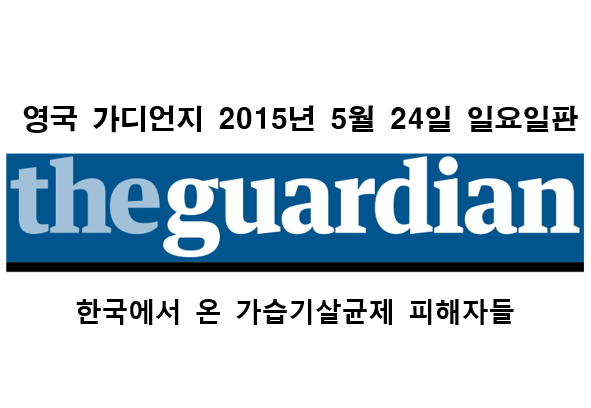We won’t say sorry for link to poison deaths – UK firm

We won’t say sorry for link to poison deaths – UK firm
Daniel Boffey Sunday 24 May 2015 00.08 BST
Reckitt Benckiser, maker of one of disinfectants blamed for loss of 142 lives in South Korea, refuses to admit culpability
The first point at which Kim Duk-jong, a firefighter in South Korea, felt that all was not right with his five-year-old son, Kim Seung-jun, was when the normally lively toddler didn’t want to play: “He just wanted to lie down and he had a bit of a fever. Then he struggled to breathe.”
His parents took him to the Kyungpook University hospital in Daegu. Within six days of the first signs of ill health, he died. “The doctors said it was a mystery,” said Kim. It took six years for him to discover what had happened to his son – and the 500-plus other victims known to have been affected by similar symptoms, 142 of whom are now dead.
He learned the truth on 31 August 2011 via national television. The newsreader reported that an official inquiry into an unexplained outbreak of serious lung disease similar to pneumonia – particularly prevalent among children and pregnant women – had discovered a “significant association” with the use of humidifier disinfectant that was targeted at parents in a country where winters are dry and cold.
The market leader in sales of the disinfectant, used by 8 million people in Korea, was the British company Reckitt Benckiser, which made a £2.13bn profit in 2014. Its products include Finish dishwasher tablets, Harpic, Calgon and Dettol. Seoul believes that 80% of those who died with symptoms similar to Kim’s son had used the Berkshire-based company’s clear liquid disinfectant. Its product, Oxy, was only sold in South Korea and has now been withdrawn, as have similar products.
The Korean Free Trade Commission further found Reckitt Benckiser guilty of falsely advertising its product as “safe to humans”. The firm’s subsequent appeal was thrown out by the South Korean Supreme Court. But four years on, Reckitt Benckiser refuses to admit culpability or to provide a frank apology.
A spokeswoman told the Observer that it “sympathises deeply with all those who have suffered”, including the 100 people said to have died after using its product, but added that legal cases being taken by 221 people against the firm in the South Korean courts precluded further comment. In turn, the company is challenging the government’s report in the courts.
The company has nevertheless, it said, made a “humanitarian donation” of £5m to an account designated by the Korean ministry of environment to cover some of the victims’ costs. The spokeswoman said this should not be taken as an acceptance of culpability.
Last week, Professor Domyung Paek, author of the government’s first report – there have been two; another is under way – came to the UK with Kim. With them was Maeng Chang-soo, the husband of a 30-year-old pregnant woman who died after using Reckitt Benckiser’s product, and Kang Chan-ho, the father of an eight-year-old girl who now struggles with lung damage after using a similar Danish product called Cefu.
Paek, who joined the victims in a vigil outside Reckitt Benckiser’s offices in Slough, said it is a genuine apology that they seek, not “lip service”. “The company claims its core values are ‘health, hygiene and home’,” Paek said. “In truth, it has destroyed the health of the victims, brought disease into their homes and ruined families.
“The parents of children who have died – nearly half of them were women or children – have often struggled to live on with the tragedies, and we have seen many homes broken apart. The company and its executives say they are sorry, but they do not accept responsibility. That is their formal position. And it isn’t good enough.”
Maeng, whose wife died in 2011, said: “My wife began to use humidifier disinfectants around 1998 and we conceived a boy in February 2002. Suddenly she suffered from the symptoms of a cold and fever. She was hospitalised and, at firs,t the doctor didn’t know what the disease was. He mentioned asbestosis and persuaded my wife to continue treatments. However, she developed complications. The lives of my wife and baby were suddenly at risk and I agreed to have an induced labour and for my baby to be put in an incubator, although we were just seven months into the pregnancy.
“The baby did grow to a normal size eventually but my wife had difficulty breathing. She left hospital but, over the next four years, the symptoms would come and go. They got worse in 2011 and she died. I would ask the chief executive of this company to think of me, and my other children, of nine and 12, who have lost their mother.”
The Reckitt Benckiser spokeswoman said the company “cannot even begin to imagine the depth of the grief suffered by the families affected by this tragedy and the hardships they have had to endure”, adding: “This matter is unprecedented due to the complexity and technical nature of the issues, as well as the number of related parties potentially involved. The question of causation is still very much a live issue and is subject to judicial review in the litigation.”
Kim and his family’s battle goes on.
http://www.theguardian.com/world/2015/may/24/uk-firm-poison-claim




